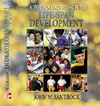|
 |  Life-Span Development: A Topical Approach John W. Santrock
Cognitive Processes and Development Information Processing
Learning Objectives- THE INFORMATION-PROCESSING APPROACH
- Exploring the Information-Processing Approach
- Characteristics
- Comparing the Information-Processing Approach with the Cognitive Developmental Approaches
- PROCESSING SPEED
- ATTENTION
- What Is Attention?
- Infancy
- Childhood and Adolescence
- Adulthood and Aging
- MEMORY
- What Is Memory?
- Infancy
- Childhood
- Short-Term and Long-Term Memory
- Memory Span
- How Accurate Are Children's Long-Term Memories?
- Strategies
- Scripts
- Knowledge
- Adulthood and Aging
- Memory and Study Strategies
- . Pay Attention and Minimize Distraction
- Understand the Material Rather than Rotely Memorize It
- Organize What You Put Into Memory
- Use Mnemonic Strategies
- Ask Yourself Questions
- Spread Out and Consolidate Your Learning
- Cognitively Monitor Your Progress
- Be a Good Time Manager and Planner
- Developmental Changes
- Episodic Memory
- Semantic Memory
- Cognitive Resources: Working Memory and Processing Speed
- Explicit and Implicit Memory
- Memory Beliefs
- Noncognitive Factors
- Memory Training
- Conclusions about Memory and Aging
- THINKING
- What Is Thinking?
- Childhood
- Critical Thinking
- Schools and Critical Thinking
- Domain-Specific Thinking
- Mathematical Thinking
- Scientific Thinking
- Adolescence
- Critical Thinking
- Decision Making
- Adulthood and Aging
- Expertise
- Use It or Lose It
- Practical Problem Solving
- Cognitive Training
- METACOGNITION
- What Is Metacognition?
- Strategies and Metacognitive Regulation of Strategies
- Developmental Changes
- The Young Child's Theory of Mind
- Becoming Aware That the Mind Exists
- Understanding Cognitive Connections to the Physical World
- Detecting Accuracies/Inaccuracies of the Mind
- Understanding the Mind's Active Role in Emotion and Reality
- Metamemory in Children
- Adolescence
- Adult Development and Aging
|
|
|



 2002 McGraw-Hill Higher Education
2002 McGraw-Hill Higher Education